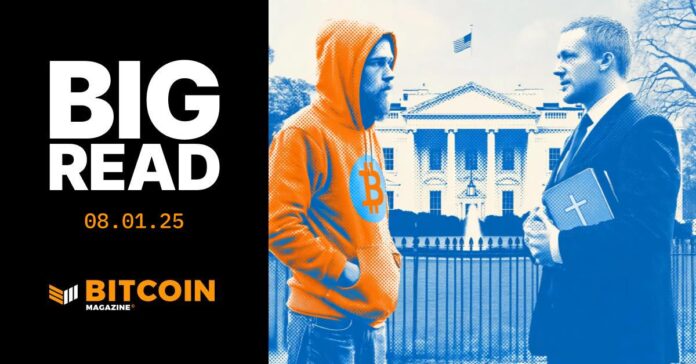The Political Awakening of Evangelicals
The presidential election of 1980 engendered an unlikely and novel political alliance in the United States that still shapes the political landscape today.
By today’s standards, it may be hard to imagine a time during which white Evangelical Christians intentionally abstained from coordinated political activity. But in the middle of the 20th century, this was normal. While individual Christians may have engaged in civic life, there was no nationally coordinated voting bloc and any political power Christians had was diffuse and not overly partisan. It was widely held that engaging directly with politics, especially at a national level, was worldly and undignified.
This all changed in 1980 when a small group of influential and connected leaders in the Evangelical community decided, in a move that has thus far proven impossible to undo, to align themselves with a charismatic celebrity-turned-politician running for president.
On first inspection, the political pairing of Evangelicals with Ronald Reagan seemed like a misfit. Not only was Reagan a divorced Hollywood elite, but he was ironically running against a devout Southern Baptist from Georgia — Jimmy Carter. This episode in political history raised a lot of questions: What political backdrop made this alliance feel so urgent for Evangelical leaders? What did the Evangelical community get in return for their political support? Perhaps most importantly: What did it cost them in the long run?
In the decades leading up to the 1980 election, many Evangelicals had plenty of evidence to support the feeling that their vision for America was being attacked, threatened or ignored. In 1973, the Supreme Court decided Roe v. Wade and made abortion legal in the United States. Through the 1960s and 1970s, a new wave of feminism sought to give women the legal right to a bank account, the ability to work outside the home and new political power. This second wave of feminism was largely made possible by the introduction of the birth control pill. For a variety of legal and cultural reasons, divorce rates were on a sharp rise around the same time. The gay rights movement symbolically began with the Stonewall riots in 1969. In the 1960s, prayer was removed from public schools, while evolution was made legal to teach. In the 1970s, the IRS began revoking the tax-exempt status of segregated Christian schools, upsetting some Christians who claimed, unsuccessfully, that racial segregation was a sincerely held religious belief.
One doesn’t have to agree with the political concerns of the Evangelical community of the time to empathize with the feeling that their vision for America’s future was under attack. It is also clear why they would seek a solution to their concerns by forming a political alliance with a presidential candidate that would speak to their values and beliefs. Within this context, it becomes easy to see why a small number of leaders in the Evangelical community, like Jerry Falwell and others, formed the “Moral Majority” in 1979 and explicitly aligned themselves with presidential candidate Ronald Reagan. New talking points like “family values” entered the political vocabulary as a shorthand to protest all of the rapid changes listed above. Reagan was willing to speak to these concerns and eager for the political support of a voting bloc that, to this point, hadn’t existed in any well-defined or organized way. Reagan won the 1980 election comfortably with a decisive 61% of the white Evangelical vote.
Power, Hypocrisy and the Cost of Political Alignment
For the Evangelicals who supported him, the alliance with Reagan was an important victory. It cemented the role of the religious right as a powerful political demographic that could swing elections. More attention was given to the concerns of Evangelicals with Reagan appointing conservative judges and changing his stance to openly oppose the Equal Rights Amendment. Evangelicals enjoyed increased political power and national recognition with both fundraising and media clout. The vocabulary shifted across the political substrate to the point where Democrats like Tipper Gore would invoke “family values” while advocating for parental advisories on movies and video games in the 1990s.
Evangelicals were able to point to many tangible and symbolic victories to rationalize their alliance with Ronald Reagan and the Republican party — but what did it cost them?
Several decades later, the number of Americans who identify as being religious is on the decline. Depending on the survey, between 35% and 45% of Generation Z identify as religiously unaffiliated. This sharp increase mirrors a broader pattern across the industrialized world. But interestingly, young Americans cite hypocrisy, political entanglement and intolerance as the main reasons they are dissatisfied with organized religion. This trend should be concerning for any group (religious or otherwise) that depends on the growing adoption of their beliefs and worldview to be successful.
The sustained and ubiquitous decline in religious affiliation, along with the explicit branding of religious ideals as belonging primarily to one political party, has been damaging to the growth of the Evangelical movement. Not surprisingly, these dynamics took decades to unfold to the point where they could be fully examined.
For those in the Bitcoin community seeking to gain lessons from this episode in political history, while the long-term increased difficulty in gaining adoption is a distressing factor, it is not the most distressing consequence to consider. More detrimental than slowing adoption is that by shackling itself to the Republican party, the Evangelical movement suffered the slings and arrows of political (mis)fortune and has habitually been expected to compromise its ideals and cede its moral authority.
In 1980, Reagan won a then-unprecedented 61% of the white Evangelical Christian vote. Since then, the religious right has become even more polarized; Donald Trump secured 80% of the same vote 44 years later.
Setting politics aside, Donald Trump is arguably the least Christ-like political figure we have had in America since the Moral Majority helped gain Ronald Reagan his first presidential victory in 1980. Donald Trump is a multiple divorcee, a serial adulterer, a serial fraudster, has admitted to and been credibly accused of sexual assault, has been convicted of multiple financial crimes in an attempt to cover up an affair with a porn star — and had a publicly documented social relationship with convicted pedophile and sex trafficker Jeffrey Epstein.
Yet, he is overwhelmingly supported by the religious right.
There are two concerning lessons for Bitcoiners from this dynamic. Firstly, aligning a movement with one political party or divisive political figure is bad for adoption. This is the more obvious concern and has been articulated by many Bitcoiners besides me. Secondly, and perhaps more importantly, such a political alliance can corrupt and compromise the very ethos of the Bitcoin movement itself. In other words, Bitcoin is in danger of falling into a trap of partisan capture.
Bitcoin’s Moment of Political Temptation
While Donald Trump could be seen as an extreme example of Christian voters compromising their principles, this trend didn’t start with Donald Trump. Republican politicians have spectacularly scandalized themselves with affairs, hypocrisy and criminality for decades, and yet the religious right has always felt the need to support them. The claim isn’t that political scandal is unique to Republicans, but that there is an extreme cognitive dissonance required to support adulterous politicians who also claim to support family values. By linking a movement to a single political party, it removes the flexibility needed to make politicians fight for your vote and uphold your values. Jerry Falwell could have never predicted that by helping to create a new political Evangelical movement, it would lead to 80% of his base supporting someone like Donald Trump. A favorable political alliance decades ago has inexorably changed what it means to be an Evangelical Christian voter in America, much to the chagrin of many in that group.
In the field of computer science, this approach of seeking out short-term benefits at the expense of longer-term success has a name: the greedy algorithm. You would witness the greedy algorithm if you ever watched a child play chess and immediately capture an opponent’s pawn without thinking a couple of moves ahead.
The Evangelical political movement prioritized short-term gains because they were feeling attacked and ignored. Because of this, they were forced to sacrifice long-term spiritual credibility, flexibility and broad appeal. This all had a long-term cost for the adoption of their movement, but also the moral and religious integrity of their group. Could the same thing happen to Bitcoin? History doesn’t repeat itself exactly, but it does provide lessons to those willing to learn.
There is no doubt that in 2024, the Bitcoin community — like the religious right in 1980 — was feeling under attack. Hostile political rhetoric, criminal prosecution of software developers and an intentional weaponization of the legacy financial system to cut off bitcoin and crypto were all important factors for Bitcoiners heading into that year’s election.
Bitcoin is often described as antifragile, meaning that challenges and obstacles not only don’t stop it, but make it more robust.
Bitcoiners often describe themselves as having a low time preference, meaning they align their priorities and actions for the long term, choosing to deprioritize short-term gains.
That said, it’s easy to empathize with the feeling that the Bitcoin community needed to form a political alliance with a charismatic celebrity-turned-politician running for president in order to stem the assault on Bitcoiners’ vision for America’s future. Unfortunately, the urgency that some in the community felt to create that political alliance betrayed the very antifragility and low time preference that are foundational elements of the Bitcoin movement.
Just as Jerry Falwell did with Reagan, influential leaders in the Bitcoin space, like David Bailey, decided to align themselves with Donald Trump in 2024. And, like Ronald Reagan had done with some of his positions, Trump was willing to reverse his position on Bitcoin to gain political and fundraising support.
I am on the record opposing the choice to court Trump and have routinely referred to this decision as an example of short-term thinking and one that will have negative long-term consequences for the Bitcoin community. I had the chance to discuss these concerns in a conversation with David Bailey during an appearance on The Progressive Bitcoiner (TPB) podcast on July 9, 2024. Later that month, Donald Trump and I both, separately, took the stage at the Bitcoin Conference to talk about the ways politics and Bitcoin intersect.
Like many people, I was not impressed by Trump’s speech at the 2024 Bitcoin Conference, and it is worth noting that Representative Ro Khanna (D-CA) spoke more fluently and with more authority about Bitcoin and its value proposition than did Donald Trump at that same event. Khanna described the power of Bitcoin’s decentralization, argued that Bitcoin is about freedom and said explicitly that he didn’t want the Federal Reserve to have a monopoly on how instantaneous payments should work. He argued forcefully about the importance of America leading in this innovative new technology and spoke about approaching Bitcoin in a bipartisan way in Congress.
In comparison, Donald Trump was meandering, partisan and dismissive.
The distinction between Ro Khanna’s fireside chat with me at the 2024 Bitcoin Conference and Donald Trump’s keynote speech highlights an important consideration. In July 2024, there was a thin sliver of hope that the Bitcoin community could convince politicians from both sides of the aisle to engage with Bitcoin in productive ways. Bitcoin speaks to both progressive and conservative values, and there is no shortage of Republicans or Democrats willing to reconsider their approach to an issue in exchange for the promise of money or votes.
At that moment, Bitcoiners just needed to follow their own advice and zoom out. July 2024 was our last best chance to decentralize the political support for Bitcoin among both voters and politicians. Bitcoiners could have made the long-term play to force the political parties to compete for our support. Instead, Bitcoiners largely lined up to support the most polarizing political figure in generations.
Given the previous administration’s hostility toward Bitcoin, this makes some sense. Having recently relistened to my conversation with David Bailey on TPB, I can admit that many of the claims that David offered to support his decision to align with Trump have panned out. Like Evangelical Christians looking at Reagan’s support in the early 1980s, there have been some positive effects of aligning with Trump. Viewed through an appropriately narrow lens, bitcoin’s short-term benefits from supporting Trump are obvious only seven months into his term.
Bitcoin has been thrust into the mainstream political conversation within the United States. (Some other nations have also taken notice.) Trump has offered other wins to the Bitcoin community, like freeing Ross Ulbricht on day 2 and an Executive Order establishing a strategic bitcoin reserve. The regulatory environment has been more accommodating to the Bitcoin industry, which is part of the reason we have seen increased institutional adoption in recent months. Trump is a skilled marketer and can bring Bitcoin to the attention of an audience of millions. Additionally, the USD-based price of bitcoin has almost doubled since Election Day.
These are all wins for the Bitcoin community — and have been celebrated as such. They are also all things David Bailey predicted would happen through his support of then-candidate Trump.
The Branding Problem and Reputational Risks
As always, there is more to the picture. It is already more difficult for me to talk with friends, family and coworkers about Bitcoin because Donald Trump has been so closely tied to the technology since the 2024 campaign. To be fair, my friends, family and coworkers were not tripping over themselves to talk to me about Bitcoin before the election, but whenever I did get them to have a conversation, it was about Bitcoin; now the conversation is about Donald Trump. And it’s not just folks in my regular life: The same phenomenon is happening with elected officials and their staff. If you walk, like I have, into the office of any Democratic Senator or Representative to advocate for Bitcoin, you’ll spend most of your allotted time talking about Donald Trump’s ethics violations in the crypto space. Many Bitcoiners have reached out to me to share similar stories from their own experience.
Perhaps, like me, you’re skeptical of Donald Trump’s Bitcoin bona fides. From time to time, he does provide favorable talking points about Bitcoin, but these are genuinely overshadowed by his own morally bankrupt dabbling in the self-dealing and grifting scams embodied by the “crypto” industry. These are the same scams so strongly fought against by principled Bitcoiners. TrumpCoin, MelaniaCoin, World Liberty Financial all follow in a long line of self-enriching scams like Trump University and the Trump Foundation that the general population associates with Donald Trump.
Bitcoin already had a branding problem with regular folks having trouble differentiating between the value of Bitcoin and the rest of crypto. Donald Trump’s involvement in the space has made that branding problem much worse. It is worth noting that 94% of people don’t know that Bitcoin has a supply cap of 21 million; now we’re asking that population to be able to disentangle Bitcoin from both Trump and the wider world of crypto.
Donald Trump is a known scammer who thinks that appeasing a Bitcoin audience with a few talking points copied from RFK gives him a blank check to enrich himself with crypto pump-and-dump schemes.
It’s a conflation that does not serve the Bitcoin community. On top of this, some of the victories the community has seen since inauguration day have been symbolic at best. The establishment of a strategic bitcoin reserve has been sullied by the President’s establishment of a digital asset stockpile, which includes other cryptocurrencies and further blurs the lines for Bitcoin’s critics. At the same time, we are still waiting for the first “budget-neutral” purchase for the nation’s strategic bitcoin reserve. The president’s company, Truth Social, has chosen to build a treasury that includes bitcoin, Ethereum, XRP, Solana and Cardano. Trump infamously ended his speech in Nashville by ad-libbing, “Have a good time with your bitcoin, your crypto and everything else you’re playing with.” It seems like he wanted to play with crypto too.
It is likely that Bitcoin will get caught in the crosshairs of the backlash against Trump, whenever that comes. Executive Orders are as easy to undo as they are to sign. I’m not confident that the next president will scrap the digital asset stockpile — like they should — while still making Bitcoiners happy by keeping the SBR. Nor will bitcoin be spared as a talking point from the multitude of crypto-related investigations into the administration’s ethics violations when the other party eventually comes into power.
Most damaging to Bitcoin’s reputation, Democrats will be able to tell the truth about Trump’s self-dealing scams in the crypto space and allow folks to make the connection to Bitcoin themselves. Indeed, we already see the same picture of Trump at the Bitcoin conference every time a newspaper writes about his shady dealings in crypto. Millions of people regularly read factual stories about the latest Trump crypto scam and are provided an inconvenient visual of Trump standing on the stage in Nashville with the word “Bitcoin” plastered behind him.
All of these examples highlight the very obvious reputational risk that Donald Trump poses to Bitcoin. I, and others like me, have been sounding this alarm from the very beginning. Forming a political alliance with a polarizing figure impedes Bitcoiners’ ability to educate and advocate for adoption and sensible Bitcoin policy. Sadly, the view among the general population that Bitcoin is a scam has been ossified for the foreseeable future. We have seen some short-term wins, for sure. But this entire episode will have a dampening effect on adoption that may take decades to fully play out.
Like our example of the Evangelical Christians’ alliance with Ronald Reagan forewarns, this might not even be the most serious risk from aligning with Donald Trump. What could such a myopic political alliance do to the Bitcoin community during the next 44 years?
Since Inauguration Day, we have seen Donald Trump engaged in bitter feuds with former allies like Elon Musk. We have seen him threaten to sue Rupert Murdoch for accurate but unfavorable reporting that connected him to Jeffrey Epstein. We have seen Trump go to war with his former supporters over the release of the Epstein files. Nearly every single cabinet-level official from the first Trump term chose not to endorse him when he ran in 2024, with those officials often drawing the President’s ire. All of which, if I were David Bailey, would make me very nervous. What happens if David ever feels the need to stand up against Trump to defend an important property of the Bitcoin protocol? Or even worse, what if he isn’t brave enough to do it?
A Call for Political Decentralization
One day, Donald Trump — or some other politician in twenty years — could make a demand that threatens Bitcoin’s decentralization. What happens when a politician tells our community that Bitcoin isn’t necessary because we have stablecoins or TrumpCoin? What if the political party that Bitcoin tied itself to deems crypto more profitable than Bitcoin and wants to drop the latter completely? Could the Bitcoin community become so compromised that they cheerfully vote against Bitcoin’s best interest, the way Evangelicals have done? If we tie ourselves so strongly to one political party and completely alienate the only other alternative, it could happen without us even realizing it. Remember, it only took 36 years for Jerry Falwell’s Christians to vote for Donald Trump.
Already we have Bitcoiners abiding the President’s dabbling in crypto scams or even characterizing them as evidence he is a friend to the industry.
Already we have Bitcoiners going to bat over stablecoin regulation that brings us one step closer to a CBDC.
Already we have Bitcoiners willing to look past all of the deep character flaws and unsettling political truths just to get close to someone in power who is willing to say nice things about Bitcoin.
What happens if and when Trump’s relationship with Bitcoin sours? A few years ago, it was impossible to imagine Trump going to war with Rupert Murdoch, but now he is. Does it seem that unlikely that he’ll one day go to war against Bitcoin?
The well-intentioned Christians who joined the Moral Majority in 1980 to support Ronald Reagan were making a calculated decision. I wonder what they would think about that movement morphing into what it has become today? Would those Evangelical Christians from 1980 recognize themselves in the president they voted for in 2024? We should be asking the same questions about the political alliance being formed with Donald Trump right now. What does the political landscape of Bitcoin look like 44 years from now?
Bitcoin’s promise lies in its neutrality and decentralization. Tying Bitcoin’s brand to a divisive political figure or a single political party will prove to be dangerous in the long run. So what can we do?
Keep talking about Bitcoin and trying to educate your friends, family, coworkers and elected representatives. This means you will have to discuss Trump, but be sure to untangle his involvement in Bitcoin from Bitcoin’s tremendous value proposition. Be sure to also differentiate bitcoin from Trump’s crypto scams. Like me, you probably didn’t ask for this burden, but now it is ours to share. Advocate for sensible Bitcoin policy — like the right to run a node or mine Bitcoin. And do all of this with people across the political spectrum. A strategic bitcoin reserve is good, but fundamentally flawed if it does not come from bipartisan legislation. A de minimis tax exemption for Bitcoin is important, but would be more protected and respected if it came from bipartisan legislation. Decentralizing Bitcoin’s political support is critical for its long-view legal status and adoption in the United States.
There are plenty of examples in the history of technology (television, electricity, internet, social media) where political lobbying was balanced and nonpartisan. And if you want that vision for Bitcoin, you should also support the nonprofit The Progressive Bitcoiner, an organization that is dedicated to increasing Bitcoin’s visibility among politicians and voters on the left. Their laser-focused mission is to help our community avoid the backlash for Bitcoin that sadly seems unavoidable now.
We should all learn from the mistakes and long-term costs of the Evangelical movement that courted Ronald Reagan. We must not allow Bitcoin to be a monolithic bloc. We must hold politicians accountable to say and do the best things for Bitcoin. We must not abide politicians self-dealing in crypto scams. We must not allow politicians to get away with conflating bitcoin with the wider crypto space. Vote for and donate to politicians — even if they’re Democrats — who can speak fluidly about Bitcoin’s value proposition and pro-social use cases, the way Ro Khanna did at Bitcoin 2024. Any politician who is willing to damage Bitcoin’s reputation by engaging in self-enriching crypto garbage does not fundamentally understand Bitcoin’s value proposition and does not deserve our support.
My preference would have been to keep Bitcoin out of presidential politics for another 8 to 12 years. This would have been enough time to develop bottom-up, grassroots support for Bitcoin that neither political party could ignore. I didn’t get my preference and almost none of us had a voice in deciding to align with Donald Trump; a few well-connected people made that choice for us. Now we must soberly assess the risks and benefits (there are both!) of that alliance and do our best to broaden Bitcoin’s political appeal in the face of extreme polarization. That work has never been more difficult or more important. When doing so, remember that having a low time preference, zooming out and embracing decentralization are all fundamental to the ethos of Bitcoin. Continue to think in the long term and try to broaden the appeal for a technology that has the potential to make the country and the world a better place. We have work to do.
Have a good time with your bitcoin, but playtime is over.
C. Jason Maier is a math teacher and Bitcoin educator, and lives with his family in Connecticut. His book, A Progressive’s Case for Bitcoin, was published by Bitcoin Magazine Books in 2023 and explores how Bitcoin is a powerful tool to help create a more just, equitable and peaceful world.
BM Big Reads are weekly, in-depth articles on some current topic relevant to Bitcoin and Bitcoiners. If you have a submission you think fits the model, feel free to reach out at editor[at]bitcoinmagazine.com.
Opinions expressed are entirely the author’s own and do not necessarily reflect those of BTC Inc or Bitcoin Magazine.






